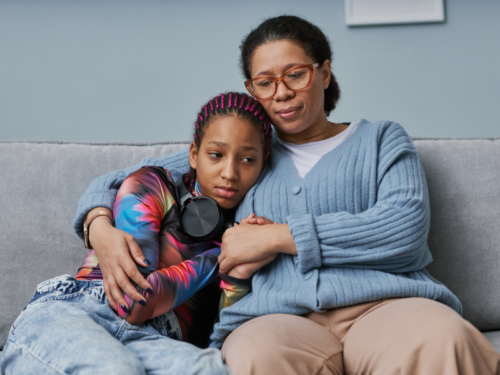
Table of Contents
What Is the Best Therapy for Depression?

Written By: Ethan Cohen BSN, RN

Clinically Reviewed By: Dr. Don Gasparini
October 3, 2023
9 min.
Consider this your guide to the best evidence-based therapies for depression treatment, complete with tips about how to collaborate with mental health professionals for better results.
Learn more about our Clinical Review Process
Table of Contents
One of the most challenging aspects of living with depression is that the symptoms can make it difficult to seek help. When a person is going through a depressive episode, it can feel like a challenge to get out of bed, let alone reach out to a therapist. If you suffer from depression, remember you are not alone. Reports and studies show that around 30% of adults and teens have dealt with depression in their lifetime.
While depression can be a devastating mental health condition, the good news is that it often responds well to treatment. For this reason, if you are experiencing symptoms of depression, the best thing you can do is reach out for help—especially if your symptoms last more than two weeks and affect your ability to engage fully in your daily activities, which is the clinical threshold for a depression diagnosis.
Various evidence-based treatment options are effective in improving depression symptoms and treating depression, including mild depression, moderate depression, and even treatment-resistant depression. While everyone’s depression treatment plan should be tailored to their specific needs, this article will explore some of the best therapies for treating depression.
What is the best therapy for depression?
Cognitive behavioral therapy (CBT) and interpersonal therapy (IPT) are two widely practiced and extensively researched forms of talk therapy found to be most effective for managing depression. This is especially true for people with mild depression or moderate depression. Pairing talk therapy with prescribed antidepressant medications is a common form of depression treatment; studies show that a combination of therapy and medication management is more effective than either treatment on its own. This is especially true for people with more severe depression or treatment-resistant depression, who may also benefit from new drug therapies, like ketamine, according to some research.
While a combination of CBT, IPT, and medication management tends to be the best treatment approach for most people with depression, what works for one person may not work for another. Depression is one of the most treatable mental health conditions, but finding the treatment option that works best for you requires collaboration with a mental health clinician and often depends on individual preferences, the severity of the depression, and the specific circumstances. In essence, the best therapy for depression is the one that works best for you.
Here’s a comprehensive breakdown of how CBT, IPT, medication management, and collaborative work with mental health professionals can help treat depression.
Cognitive behavioral therapy
Interpersonal psychotherapy
Medication management
Collaborating with your mental health provider
A type of talk therapy that is used to identify and challenge negative thought patterns contributing to depression.
A type of talk therapy that teaches strategies for dealing with relationship issues that arise because of depression.
The use of antidepressants is an effective tool to treat depression, especially for people with more severe symptoms.
Actively participating in your depression treatment will make your road to recovery much easier.
How cognitive behavioral therapy (CBT) can help treat depression
CBT is a type of mental health treatment that is used to help identify and challenge the negative thought patterns that are contributing to depression. Feeling down, thinking you are unworthy of love or success, and having difficulty engaging in positive coping skills are all characteristics of depression. Working with a therapist and engaging with the tools offered within the CBT therapeutic framework has the potential to modify your thoughts, feelings, and behaviors so that your relationship with yourself and the world around you can improve.
A large aspect of CBT is addressing what is known as cognitive distortions. Cognitive distortions include catastrophizing (assuming the worst will happen), black-and-white thinking (seeing things as all good or all bad), and overgeneralization (making broad negative conclusions based on limited evidence). These ways of thinking are common during depressive episodes. Learning how to not only challenge these negative thought patterns but change them into more constructive and positive ways of thinking is one of the primary goals of CBT.
A specialized form of CBT, known as dialectical behavior therapy (DBT), is commonly used in the treatment of depression. This therapeutic modality teaches mindfulness, distress tolerance, emotional regulation, and interpersonal skills. DBT helps illuminate the idea that we can hold two contradictory concepts, such as acceptance and change, in our minds simultaneously. By learning to better understand and tolerate these contradictory emotions, DBT encourages individuals to accept themselves while striving for personal growth and change.
How interpersonal psychotherapy (IPT) can help treat depression
While CBT focuses on personal thoughts, feelings, and their associated behaviors, IPT shifts the focus toward the difficulties you may be experiencing in your relationships. Interpersonal conflict, overwhelming life changes, grief and loss, and problems maintaining and sustaining relationships can all contribute to a person’s challenges with depression. IPT attempts to teach strategies for dealing with these difficult issues. Working to improve your relationships with other people while addressing your depression has the potential to lessen the amount of conflict you experience on a daily basis, helping to improve some of the negative circumstances that may contribute to your depressive symptoms.
How medication management can help treat depression
Depending on the severity of your depression, your mental health provider may recommend antidepressants to help optimize your treatment plan. These medications improve the way your brain produces and synthesizes neurotransmitters, the chemicals that regulate your mood and stress levels. Following the directions given to you about how to correctly take these medications is incredibly important.
Many antidepressants take at least eight weeks to start working. Also, it can take trial and error to determine which medication is right for you. Some people may need to try several different antidepressants before finding the best medication for them. As always, being transparent and honest with your mental health provider about the effectiveness of your medication is essential.
Every medication, including antidepressants, has possible side effects. You should alert your mental health provider if you begin to experience any side effects associated with antidepressants (which may be a sign to try a different medication). Also, it is advisable to consult your clinician before starting or stopping any antidepressant.
Depending on the severity of your symptoms, taking medications may only be a part of your plan of care temporarily or not at all. In many cases, medications are simply meant to help support you during the more acute phase of depressive symptoms while you learn to apply the cognitive and emotional skills offered in talk therapy. Some people may eventually move to a depression treatment plan that includes talk therapy only. On the other hand, some people may require long-term medication support to manage depression.
The importance of collaboration in treating depression
The reality is that the best treatment for depression is the one that works best for you. Clinicians specialize in understanding and treating mental health conditions and use evidence and experience to guide their decision-making processes. But you know yourself best, so it’s important to collaborate with your clinician when creating a care plan for depression.
Actively participating in your care will make your road to recovery much easier. Sometimes, recovery from depression can take a very long time. It can be overwhelming and frustrating, but giving therapy time is important. Remember that sharing how you feel with your therapist and remaining open to suggestions can be helpful when you feel you are facing roadblocks. Be transparent about what you feel is and is not working for you. In this way, you and your therapist can adjust and modify your plan of care in a way that makes you feel as though you are receiving the most benefit from the time you are investing in your experience in therapy.
Your therapist will offer you innumerable tools, skill sets, and new ways of thinking that can positively impact your attempt to improve your depression symptoms. They may also refer you to a clinician for medication management. However, depression medication may still take several weeks to start working and applying the lessons you’ve learned in therapy in your daily life takes time and practice. Be patient on your path toward healing.

What does depression treatment look like?
As mentioned previously, depression treatment generally involves talk therapy. If it’s your first time meeting with a therapist or you haven’t met with a therapist to discuss depression before, it’s normal to wonder what your sessions will look like. Here are some things you may expect from your depression treatment:
Assessment
Many mental health professionals will begin treatment by asking about your full health history—including your mental and physical health. Through this assessment, they will better understand the nature and severity of your depressive symptoms and begin to develop a treatment plan that’s most appropriate for your unique circumstances.
Discuss concerns related to depression
During the course of therapy, you will talk with a mental health provider about the issues you are facing related to depression. Sometimes, the sessions with your therapist can be upsetting or feel overwhelming. Working through these difficult emotions is part of the journey towards improvement.
Learn depression-management skills
In collaboration with your therapist, you will learn various skills, coping mechanisms, and exercises to help you address your challenges with depression. Depending on the kind of therapy you choose, you may learn how to regulate your thoughts and behaviors (CBT) or interpersonal relationship skills (IPT).
Addressing co-occurring mental health conditions
Research shows that depression is commonly found alongside other mental health conditions such as anxiety and attention-deficit/hyperactivity disorder (ADHD). For this reason, it’s helpful to work with a mental health professional who can ensure that your treatment plan is designed to address the totality of your clinical situation.
Referring to higher levels of care
Treatment for depression is not one-size-fits-all. Some people with mild depression may benefit from once-weekly therapy, whereas others with more severe depression, especially those considering self-harm, may need more support. In other words, the severity of your symptoms will influence the level of care that you may need to best ensure your continued safety and the likelihood of effective treatment. If necessary, your therapist can work with you to refer you to a higher level of care, like intensive outpatient programming or a partial hospitalization program.
Do you need more support with
your mental health?
Charlie Health can help.
How to know if you need depression treatment
Determining if you need depression treatment is an important step in managing your mental health. Depression is a serious and common mental health condition, and seeking treatment can significantly improve your well-being. Here are some signs and indicators that may suggest you should consider seeking depression treatment:
- Persistent sadness
- Loss of interest in once-enjoyable activities
- Difficulty concentrating
- Feelings of hopelessness
- Physical symptoms, including sleep or stomach issues
- Family history of depression, which could put you at a higher risk
- Exposure to chronic stress and trauma, which can impact your neurotransmitters associated with depressive symptoms
If you relate to any of the signs and indicators listed above, you would likely benefit from contacting a mental health professional. It can be scary to admit that you are having difficulty managing your emotions, but the first step to feeling better is asking for help. Recognizing that countless people have felt the same way you do now and have found relief in working with a mental health professional can help inspire you to take the first step.
Virtual depression treatment at Charlie Health
If you or a loved one are struggling with depression, Charlie Health is here to help. Our virtual Intensive Outpatient Program (IOP) combines group sessions, personal therapy, family therapy, and medication management (as needed) to support people with serious mental health conditions, including depression, and their families.
Our expert clinicians, who use treatment modalities like cognitive behavioral therapy and interpersonal psychotherapy, are well-equipped to treat depression. In fact, a recent study showed that Charlie Health’s IOP is as effective as in-person mental health treatment for teens and young adults with depression, especially for those in marginalized groups. Most importantly, the study found that after engaging in Charlie Health virtual IOP, youth in the program reported a significant decrease in their depression.
Our IOP, which is a form of online therapy, also helps remove some of the barriers that have historically made it difficult to access higher levels of care. With virtual IOP, the convenience and flexibility of receiving online therapy can make starting your journey toward mental health treatment feel less burdensome.
Fill out this short form to get started healing today.
References
https://www.ncbi.nlm.nih.gov/books/NBK279282/
https://www.nami.org/About-Mental-Illness/Mental-Health-Conditions/Depression/Overview
https://www.nimh.nih.gov/health/topics/depression
https://www.ncbi.nlm.nih.gov/pmc/articles/PMC5310101/
https://childmind.org/article/treatment-for-depression/
https://www.ncbi.nlm.nih.gov/pmc/articles/PMC1414693/
https://effectivehealthcare.ahrq.gov/products/major-depressive-disorder/consumer





